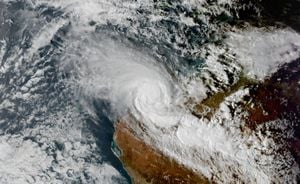Former U.S. President Donald Trump recently reignited the debate over plastic usage by signing a decree on February 10, 2025, which reverses the ban on single-use plastic utensils, including straws, put in place by his successor, Joe Biden. This decision has sent ripples through environmental circles, raising concerns over the future of ecological protections amid shifting political landscapes.
During a press conference at the White House, Trump declared, "On revient aux pailles en plastique," translating to "We are returning to plastic straws." This phrase encapsulates his administration's pivot back to traditional plastic use, which many now see as regressive against the backdrop of growing environmental awareness and action.
Trump's decree mandates federal agencies to utilize plastic straws rather than opting for alternatives like paper, which he has openly criticized. Crafting his argument, Trump commented, "Ces choses-là ne marchent pas," meaning, "These things don’t work," referring to paper straws and asserting their inadequacy for American lifestyles, especially for sipping sugary beverages.
Since taking office, Biden aimed to reduce plastic waste, recognizing its detrimental effects on the environment, particularly the oceans, where plastics threaten marine life. He set forth ambitious goals to phase out single-use plastic utensils by 2035, driven by the need for sustainable practices to combat the climate crisis.
Conversely, Trump’s recent statements reveal his climatoscepticism and dismissal of extensive studies showing the ecological impacts of plastic pollution. "Je ne pense pas que le plastique va affecter un requin," Trump stated, meaning, "I don't think plastic will affect a shark," encapsulating his disregard for environmental repercussions linked to plastic consumption.
This announcement fits within the larger narrative of Trump’s presidency, characterized by sweeping policy reversals and skepticism toward climate-related initiatives. Critics argue this move not only undermines efforts to combat ecological degradation but signals to industries reliant on single-use plastics to rejoice, potentially igniting resistance against regulations not only within the U.S. but across different regions.
Internationally, responses have ranged from astonishment to concern, particularly from nations like those within the European Union, which have enacted strict prohibitions against single-use plastics. The EU's commitment to reducing plastic waste was solidified through directives aimed at banning items like plastic straws, with legislation enacted as recent as July 2021, making Trump's decision all the more conspicuous.
Environmental advocates have swiftly condemned Trump's decree, arguing it hinders progress toward sustainable consumption. Many supporters of green policies view the return to plastic utensils as detrimental, claiming it emphasizes profit over planet. The environmental cost of plastic is staggering, with recent reports highlighting the potential damage to ecosystems and biodiversity.
The discourse around this topic is not merely about straws; it symbolizes the broader clash between two starkly contrasting philosophies: one promoting sustainability and ecological responsibility, the other favoring traditional practices irrespective of their environmental validity. Trump's decree appears to undermine the historical achievements made by previous administrations striving for environmental reform.
The backlash includes voices from various sectors, including scientific communities and environmentalists, arguing the evidence favoring paper or reusable materials cannot be dismissed. The persistent pollution of terrestrial and marine environments poses direct threats to wildlife and human health, and critiques of Trump's approach include calls for accountability and stringent policies to protect future generations.
While Trump may see his decree as pragmatic for aiding beverage enjoyment, critics regard it as flouting pressing scientific consensus about the detrimental impacts of plastic waste. With society producing about 300 million tons of plastic annually, the urgency for strategic solutions continues to intensify.
Many experts believe the ecological conversation must tackle not just policy but also societal habits surrounding consumption. The re-emphasis on plastic straws ignites discussions on individual responsibilities alongside institutional policies, questioning the choices consumers make daily.
With significant campaigns gearing up to tackle plastic waste on various fronts, this recent political pivot hints at possible shifts not only within the U.S. but globally as industries and nations echo Trump's sentiments about easing regulations. Observers speculate whether such policies could encourage companies to reconsider their commitments to sustainability, parsing down the avenues for innovation.
The ramifications of such leadership decisions present compelling contradictions as societies strive to intertwine ecological integrity with economic interests—a balancing act complicated by ever-present political infighting. With mounting tension around environmental issues, the debate on plastic straw usage becomes part of larger discourses on climate and responsibility.
Moving forward, the dialogue around responsible practices will need to progress beyond political rhetoric to meaningful solutions reflective of ecological realities. Whether the public can sustain pressure to hold leaders accountable for sustainable actions remains to be seen.
With the discourse continuing to evolve, Timelines of activism and advocacy revolving around plastic usage will witness invigorated efforts fueled by community voices, inspiring change against the backdrop of political leadership alternative to Trump's agenda and claims.
Engaging with the fundamental questions of how society balances convenience against responsibility will shape future policies. The dialogue continues, with citizens advocating for corrective measures through collective actions as the impact of plastic pollution increasingly becomes acknowledged within everyday life.
Trump’s decree may reflect current governmental priorities, but many hope it serves as motivation for broader movements, propelling citizens toward environmental stewardship.



